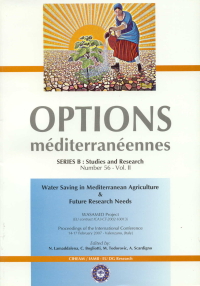| Article précédent | p. 229-238 | Article suivant |
Availability and accuracy of Mediterranean databases relevant to agricultural water uses
Drawing on the experience gained during the implementation of NOSTRUM-DSS (a coordinated action funded by the European Commission) focusing on the implementation of DSS [Decision Support Systems] tools in the Mediterranean area, this paper will explore the constraints and opportunities facing researchers, planners and managers in relation to data availability, accuracy and comparability. Experience gained during the project's implementation regarding the field of sectoral analysis necessary to support sustainable policy strategies shows that the available quantitative information related to water use in industry or tourism, or impacts of these sectors on water resources, are inadequate, or are often available only in dedicated commercial databases not accessible to the public. Nevertheless, the agricultural sector, representing the most important demand of water, is characterized by historical scarcity imposed by climatic conditions and appears to be critical in order to explore new strategies for the future. The implication of these limitations on both data and sources is explored in the paper in relation to the implementation of the Integrated Water Resource Management (IWRM) principles. It starts with the comparative evaluation of information constraints in various countries across the Mediterranean sea and the attempts to suggest instruments/approaches for improving the current situation and provide more robust bases for policy making the future.
En partant de l'expérience acquise par NOSTRUM-DSS (action coordonnée et financée par la Commission européenne) dont l'action se concentre sur le développement des Systèmes d'Aide à la Décision (SAD) dans la zone méditerranéenne, cet article explore les contraintes et les opportunités auxquelles sont confrontés les chercheurs, les planificateurs et les gérants de l'eau face à la précision et la comparabilité des données disponibles. L'expérience acquise pendant le projet montre que les données quantitatives liées à l'utilisation de l'eau par l'industrie et le tourisme, sont souvent inadéquates ou uniquement disponibles dans des bases de données commerciales, non accessibles au public. Le plus gros consommateur d'eau étant le secteur agricole, il est historiquement concerné par les problèmes de rareté imposés par les conditions climatiques et joue un rôle crucial dans la recherche de nouvelles stratégies. Les conséquences de ces limites tant sur les données que sur les sources sont analysées en relation avec le développement des principes de Gestion Intégrée des Ressources en Eau (GIRE). A partir de l'évaluation comparative des contraintes des pays méditerranéens, des approches et des instruments sont proposés pour améliorer la situation actuelle.
- [ Afficher ]
- [ Télécharger ]
- [ Exporter la citation ]
Vous pouvez télécharger la citation au format :
- [ Imprimer ]
-
Mots-clés
AIDE A LA DECISION, ANALYSE DE DONNEES, BANQUE DE DONNEES, COLLECTE DE DONNEES, EAU, GESTION DES EAUX, IRRIGATION, REGION MEDITERRANEENNECiter cet article
Crimi J., Khawlie M., Awad M., Sgobbi A., Giupponi C. Availability and accuracy of Mediterranean databases relevant to agricultural water uses. In : Lamaddalena N. (ed.), Bogliotti C. (ed.), Todorovic M. (ed.), Scardigno A. (ed.). Water saving in Mediterranean agriculture and future research needs [Vol. 2]. Bari : CIHEAM, 2007. p. 229-238. (Options Méditerranéennes : Série B. Etudes et Recherches; n. 56 Vol.II). Proceedings of the International Conference WASAMED Project (EU contract ICA3-CT-2002-10013), 2007/02/14-17, Valenzano (Italy). http://om.ciheam.org/om/pdf/b56_2/00800192.pdf



